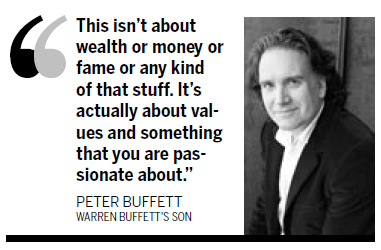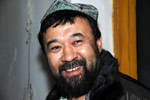Focus
A lesson of tough love for China's rich second generation
Updated: 2011-02-04 11:34
By Lu Chang (China Daily USA)
NEW YORK - Perhaps China's generation of wealthy children, the so-called rich second generation, could learn a valuable lesson from Peter Buffett.
When he was 19, he inherited $90,000 in stock from his family. But considering that Buffett's father is billionaire investor Warren Buffett, one of the richest people in the world, one clearly sees that father didn't let son have it easy.
In his new memoir, Life Is What You Make It, Peter Buffett explains that the scant financial support from his parents allowed him to become the award-winning musician he is today.
The book, released last year and with its Chinese version to be available this month, is drawing considerable attention in China at a time when the Chinese media has criticized the lavish spending habits of wealthy children.
The rich second generation has not only inherited a great deal of wealth from their affluent parents in China, they have inherited the label of spoiled heirs with little to responsibilities and an inclination to spend. Most are living off of their parents.
In fact, the wealthy are getting younger on the mainland, with an average age of 36, according to an HSBC survey released last year. The rich in the survey are defined as those who have at least 500,000 yuan ($73,840) in liquid assets.
 |
Born into a wealthy family, it would have been very easy for Peter Buffett to sponge off of his father or to pursue a career in finance. Instead, he chose to become a musician, a path he's still following at the age of 53.
Kai-fu Lee, former president of Google China, wrote the preface for Buffett's book and recently posted some extracts from the book on his blog about how Buffett's father instilled values into his children, rather than giving them everything they want.
The extracts created a stir in China. Critics said the majority of rich Chinese parents are giving too much money to their kids and making life too easy for them. Spoiling them, critics have said, doesn't teach the offspring how to survive in society.
Buffett said as a kid, he "was shown that there are lots of other people out there with very different circumstances".
"I knew I had to make it on my own," he said. "This isn't about wealth or money or fame or any kind of that stuff. It's actually about values and something that you are passionate about."
Before inheriting the $90,000 from his family, he left Stanford University and moved to San Francisco to attempt his music career. Buffett used the money to buy recording equipment and set up a studio. He said he lived frugally in a small apartment in San Francisco.
He admitted that "having that money was a privilege" and that if he was forced to make a living from the outset, he would not have been able to follow his passion.
He said he struggled for a few years in different low paying jobs. Then in 1981, he got his big break, landing a job scoring music for commercials on MTV, commercials that starred rising stars such as Kelsey Grammar, Bruce Willis and Jason Alexander.
Buffett then took his musical talent to films, composing a piece for Kevin Costner's Dances with Wolves. He also composed the soundtrack of a miniseries called 500 Nations, which was produced by Costner and won an Emmy Award for Outstanding Miniseries in 1995.
"My father did tell me to follow his footsteps but what he meant was different than other people think, so what he meant is to do something you love to do everyday," Buffett said. "In that way I did follow his footsteps, but that's not what most people think. What I'm saying is that I'm living it up everyday because I love what I do."
Many of the young heirs in China are in fact stepping into their parents' shoes as leaders of an inherited company. With many millionaires and entrepreneurs reaching the age of retirement, parents are sending their children to training courses to prepare them for leadership roles. In addition to learning how to lead a company, many are studying horseback riding, swordsmanship, golf and wine tasting.
Professor Qu Jun, a director of the second generation enterprise training program at Peking University, said 95 percent of the trainees at the institution were enrolled at the behest of their parents.
He added that in the United States, only 30 percent of family businesses are taken over by the second generation and just 12 percent make it to the third generation.
It is estimated that 3 million private enterprises in China will need to hand on the reins of power from the founding generation of entrepreneurs to their children over the next five to 10 years. Up to 95 percent of the rich second generation are unwilling to take up the family business, statistics show.
Buffett, who said he has learned from the hard lessons of his father, now lives in New York City with his second wife, Jennifer, said he wants to give back to those who are less fortunate. The two have founded the NoVo Foundation, a nonprofit organization dedicated to empowering women and girls around the world.
"Economic prosperity may come and go; that's just how it is," Buffett wrote in his book. "But values are the steady currency that earn us the all-important rewards."
China Daily
Specials

Spring Festival
The Spring Festival is the most important traditional festival for family reunions.

Top 10
A summary of the major events both inside and outside China.

A role model
Alimjan Halik had been selected as the "Cyberspace Personality Who Moved the Hearts of the Chinese in 2010".